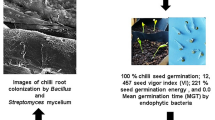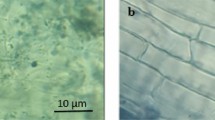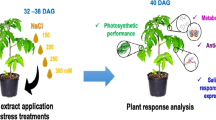Abstract
Key message
This work reveals the protective role of two rhizobacteria, Pseudomonas putida and Novosphingobium sp., on citrus plants subjected to salt stress conditions.
Abstract
Detrimental salt stress effects on crops are likely to increase due to climate change reducing the quality of irrigation water. Plant growth-promoting rhizobacteria (PGPRs) can mitigate stress-induced damage in plants cultivated under high salinity conditions. In this work, Citrus macrophylla (alemow) plants inoculated with the rhizobacteria Pseudomonas putida KT2440 or Novosphingobium sp. HR1a were subjected to salt stress for 30 days. Results showed that in absence of salt stress, Novosphingobium sp. HR1a induced a decrease of transpiration (E) and stomatal conductance (gs). Both rhizobacteria reduced salt stress-induced damage. Levels of abscisic acid (ABA) and salicylic acid (SA) were lower in inoculated plants under salt stress conditions. Similarly, under stress conditions maximum efficiency of photosystem II (Fv/Fm) in inoculated plants decreased to a lower extent than in non-inoculated ones. In stressed plants, Novosphingobium sp. HR1a also induced leaf accumulation of 3-indole acetic acid (IAA) and a delay in the decrease of quantum yield (ΦPSII). P. putida KT2440 inhibited root chloride and proline accumulation in response to salt stress. Although both bacterial species had beneficial effects on salt-stressed citrus plants, Novosphingobium sp. HR1a induced a better plant performance. Therefore, both strains could be candidates to be used as PGPRs in programs of inoculation for citrus protection against salt stress.










Similar content being viewed by others
Abbreviations
- ABA:
-
Abscisic acid
- ACC:
-
1-Aminocyclopropane-1-carboxylate
- CFU:
-
Colony-forming units
- E :
-
Transpiration
- F v/F m :
-
Maximum efficiency of photosystem II
- g s :
-
Stomatal conductance
- IAA:
-
3-Indole acetic acid
- NI:
-
Non-inoculated
- PGPR:
-
Plant growth-promoting rhizobacteria
- Φ PSII :
-
Quantum efficiency of PSII photochemistry
- SA:
-
Salicylic acid
References
Arbona V, López-Climent MF, Mahouachi J, Pérez-Clemente RM, Abrams SR, Gómez-Cadenas A (2006) Use of persistent analogs of abscisic acid as palliatives against salt-stress induced damage in citrus plants. J Plant Growth Regul 25:1–9. https://doi.org/10.1007/s00344-005-0038-6
Arbona V, López-Climent MF, Pérez-Clemente RM, Gómez-Cadenas A (2009) Maintenance of a high photosynthetic performance is linked to flooding tolerance in citrus. Environ Exp Bot 66:135–142. https://doi.org/10.1016/j.envexpbot.2008.12.011
Arbona V, Manzi M, Zandalinas SI, Vives-Peris V, Pérez-Clemente RM, Gómez-Cadenas A (2017) Physiological, metabolic, and molecular responses of plants to abiotic stress. In: Sarwat M, Ahmad A, Abdin M, Ibrrahim M (eds) Stress signaling in plants: genomics and proteomics perspective, vol 2, 1st edn. Springer, Cham, pp 1–35. https://doi.org/10.1007/978-3-319-42183-4_1
Arc E, Sechet J, Corbineau F, Rajjou L, Marion-Poll A (2013) ABA crosstalk with ethylene and nitric oxide in seed dormancy and germination. Front Plant Sci 4:63. https://doi.org/10.3389/fpls.2013.00063
Bao Y, Aggarwal P, Robbins Il NE, Sturrock CJ, Thompson MC, Tan HQ, Tham C, Duan L, Rodríguez PL, Vernoux T, Mooney SJ, Bennett MJ, Dinneny JR (2014) Plant roots use a patterning mechanism to position lateral root branches toward available water. Proc Natl Acad Sci USA 111:9314–9324. https://doi.org/10.1073/pnas.1400966111
Barka E, Nowak J, Clément C (2006) Enhancement of chilling resistance of inoculated grapevine plantlets with a plant growth-promoting rhizobacterium, Burkholderia phytofirmans strain PsJN. Appl Environ Microbiol 72:7246–7252. https://doi.org/10.1128/AEM.01047-06
Bates LS, Waldren RP, Teare ID (1973) Rapid determination of free proline for water-stress studies. Plant Soil 39:205–207. https://doi.org/10.1007/BF00018060
Bertani G (1951) Studies on Lysogenesis I. The mode of phageliberation by lysogenic Eschericia coli. J Bacteriol 62:293–300
Bresson J, Varoquaux F, Bontpart T, Touraine B, Vile D (2013) The PGPR strain Phyllobacterium brassicacearum STM196 induces a reproductive delay and physiological changes that result in improved drought tolerance in Arabidopsis. New Phytol 200:558–569. https://doi.org/10.1111/nph.12383
Cassán F, Vanderleyden J, Spaepen S (2014) Physiological and agronomical aspects of phytohormone production by model plant-growth-promoting rhizobacteria (PGPR) belonging to the genus Azospirillum. J Plant Growth Regul 33:440–459. https://doi.org/10.1007/s00344-013-9362-4
Chiquito-Contreras RG, Osorio-Acosta F, García-Pérez E, Villanueva-Jiménez JA, Zulueta-Rodríguez R, Castillo-Rocha DG (2012) Biofertilization with rhizobacteria and a consortium of arbuscular mycorrhizal fungi in citrus rootstocks. Trop Subtrop Agroecosystems 15:S72–S81
Chojak-Koźniewska J, Linkiewicz A, Sowa S, Radzioch MA, Kuźniak E (2017) Interactive effects of salt stress and Pseudomonas syringae pv. lachrymans infection in cucumber: involvement of antioxidant enzymes, abscisic acid and salicylic acid. Environ Exp Bot 136:9–20. https://doi.org/10.1016/j.envexpbot.2017.01.004
Dimkpa C, Weinand T, Asch F (2009) Plant-rhizobacteria interactions alleviate abiotic stress conditions. Plant Cell Environ 32:1682–1694. https://doi.org/10.1111/j.1365-3040.2009.02028.x
Durgbanshi A, Arbona V, Pozo O, Miersch O, Sancho JV, Gómez-Cadenas A (2005) Simultaneous determination of multiple phytohormones in plant extracts by liquid chromatography-electrospray tandem mass spectrometry. J Agric Food Chem 53:8437–8442. https://doi.org/10.1021/jf050884b
Eghomwanre AF, Obayagbona NO, Osarenotor O, Enagbonma J (2016) Evaluation of antibiotic resistance patterns and heavy metals tolerance of some bacteria isolated from contaminated soils and sediments from Warri, Delta State, Nigeria. J Appl Sci Environ Manage 20:287–291. https://doi.org/10.4314/jasem.v20i2.8
Ekinci M, Yildirim E, Dursun A, Turan M (2012) Mitigation of salt stress in lettuce (Lactuca sativa L. var. Crispa) by seed and foliar 24-epibrassinolide treatments. HortScience 47:631–636
Franklin FC, Bagdasarian M, Bagdasarian MM, Timmis KN (1981) Molecular and functional analysis of the TOL plasmid pWWO from Pseudomonas putida and cloning of genes for the entire regulated aromatic ring meta cleavage pathway. Proc Natl Acad Sci U S A 78:7458–7462
Goldman E, Green LH (2008) Practical handbook of microbiology. CRC Press, Boca Ratón
Gómez-Cadenas A, Tadeo FR, Primo-Millo E, Talon M (1998) Involvement of abscisic acid and ethylene in the responses of citrus seedlings to salt shock. Physiol Plant 103:475–484. https://doi.org/10.1034/j.1399-3054.1998.1030405.x
Gupta B, Huang B (2014) Mechanism of salinity tolerance in plants: physiological, biochemical, and molecular characterization. Int J Genomics. https://doi.org/10.1155/2014/701596
Habib SH, Kausar H, Saud HM (2016) Plant growth-promoting rhizobacteria enhance salinity stress tolerance in okra through ROS-scavenging enzymes. Biomed Res Int. https://doi.org/10.1155/2016/6284547
Hayat S, Hayat Q, Alyemeni MN, Wani AS, Pichtel J, Ahmad A (2012) Role of proline under changing environments. Plant Signal Behav 7:1456–1466. https://doi.org/10.4161/psb.21949
Heidari M, Golpayegani A (2012) Effects of water stress and inoculation with plant growth promoting rhizobacteria (PGPR) on antioxidant status and photosynthetic pigments in basil (Ocimum basilicum L.). J Saudi Soc Agric Sci 11:57–61. https://doi.org/10.1016/j.jssas.2011.09.001
Hussain S, Luro F, Costantino G, Ollitrault P, Morillon R (2012) Physiological analysis of salt stress behaviour of citrus species and genera: low chloride accumulation as an indicator of salt tolerance. S Afr J Bot 81:103–112. https://doi.org/10.1016/j.sajb.2012.06.004
Kang SM, Khan AL, Waqas M, You YH, Kim JH, Kim JG, Hamayun M, Lee IJ (2014) Plant growth-promoting rhizobacteria reduce adverse effects of salinity and osmotic stress by regulating phytohormones and antioxidants in Cucumis sativus. J Plant Interact 9:673–682. https://doi.org/10.1080/17429145.2014.894587
Kaya C, Ashraf M, Dikilitas M, Tuna AL (2013) Alleviation of salt stress-induced adverse effects on maize plants by exogenous application of indoleacetic acid (IAA) and inorganic nutrients—a field trial. Aust J Crop Sci 7:249–254
Klassen J, Allen DM (2017) Assessing the risk of saltwater intrusion in coastal aquifers. J Hydrol 551:730–745. https://doi.org/10.1016/j.jhydrol.2017.02.044
Krishnan R, Menon RR, Likhitha, Busse HJ, Tanaka N, Krishnamurthi S, Rameshkumar N (2017) Novosphingobium pokkalii sp nov, a novel rhizosphere-associated bacterium with plant beneficial properties isolated from saline-tolerant pokkali rice. Res Microbiol 168:113–121. https://doi.org/10.1016/j.resmic.2016.09.001
López-Climent MF, Arbona V, Pérez-Clemente RM, Gómez-Cadenas A (2008) Relationship between salt tolerance and photosynthetic machinery performance in citrus. Environ Exp Bot 62:176–184. https://doi.org/10.1016/j.envexpbot.2007.08.002
Mahmood S, Daur I, Al-Solaimani SG, Ahmad S, Madkour MH, Yasir M, Hirt H, Ali S, Ali Z (2016) Plant growth promoting rhizobacteria and silicon synergistically enhance salinity tolerance of mung bean. Front Plant Sci 7:876. https://doi.org/10.3389/fpls.2016.00876
Mindlin SZ, Soina VS, Petrova MA, Grolenko ZhM (2008) Isolation of antibiotic resistance bacterial strains from Eastern Siberia permafrost sediments. Russ J Genet 44:27–34
Montoliu A, López-Climent MF, Arbona V, Pérez-Clemente RM, Gómez-Cadenas A (2009) A novel in vitro tissue culture approach to study salt stress responses in citrus. Plant Growth Regul 59:179–187. https://doi.org/10.1007/s10725-009-9401-0
Moya JL, Tadeo FR, Gómez-Cadenas A, Primo-Millo E, Talon M (2002) Transmissible salt tolerance traits identified through reciprocal grafts between sensitive Carrizo and tolerant Cleopatra citrus genotypes. J Plant Physiol 159:997–998. https://doi.org/10.1078/0176-1617-00728
Moya JL, Gómez-Cadenas A, Primo-Millo E, Talon M (2003) Chloride absorption in salt-sensitive Carrizo citrange and salt-tolerant Cleopatra mandarin citrus rootstocks is linked to water use. J Exp Bot 54:825–833. https://doi.org/10.1093/jxb/erg064
Nadeem SM, Ahmad M, Zahir ZA, Javaid A, Ashraf M (2014) The role of mycorrhizae and plant growth promoting rhizobacteria (PGPR) in improving crop productivity under stressful environments. Biotechnol Adv 32:429–448. https://doi.org/10.1016/j.biotechadv.2013.12.005
Nadeem SM, Ahmad M, Naveed M, Imran M, Zahir ZA, Crowley DE (2016) Relationship between in vitro characterization and comparative efficacy of plant growth-promoting rhizobacteria for improving cucumber salt tolerance. Arch Microbiol 198:379–387. https://doi.org/10.1007/s00203-016-1197-5
Pereira SIA, Castro PML (2014) Phosphate-solubilizing rhizobacteria enhance Zea mays growth in agricultural P-deficient soils. Ecol Eng 73:526–535. https://doi.org/10.1016/j.ecoleng.2014.09.060
Planchamp C, Glauser G, Mauch-Mani B (2015) Root inoculation with Pseudomonas putida KT2440 induces transcriptional and metabolic changes and systemic resistance in maize plants. Front Plant Sci 5:719. https://doi.org/10.3389/fpls.2014.00719
Popowska M, Rzeczycka M, Miernik A, Krawczyk-Balska A, Walsh F, Duffy B (2012) Influence of soil use on prevalence of tetracycline, streptomycin, and erythromycin resistance and associated resistance genes. Antimicrob Agents Chemother 56:1434. https://doi.org/10.1128/AAC.05766-11
Prerostova S, Dobrev PI, Gaudinova A, Hosek P, Soudek P, Knirsch V, Vankova R (2017) Hormonal dynamics during salt stress responses of salt-sensitive Arabidopsis thaliana and salt-tolerant Thellungiella salsuginea. Plant Sci 264:188–198. https://doi.org/10.1016/j.plantsci.2017.07.020
Qin Y, Druzhinina IS, Pan X, Yuan Z (2016) Microbially mediated plant salt tolerance and microbiome-based solutions for saline agriculture. Biotechnol Adv 34:1245–1259. https://doi.org/10.1016/j.biotechadv.2016.08.005
Rady M (2012) A novel organo-mineral fertilizer can mitigate salinity stress effects for tomato production on reclaimed saline soil. S Afr J Bot 81:8–14. https://doi.org/10.1016/j.sajb.2012.03.013
Rincón A, Valladares F, Gimeno TE, Pueyo JJ (2008) Water stress responses of two Mediterranean tree species influenced by native soil microorganisms and inoculation with a plant growth promoting rhizobacterium. Tree Physiol 28:1693–1701. https://doi.org/10.1093/treephys/28.11.1693
Satir NY, Ortas I, Satir O (2016) The influence of mycorrhizal species on sour orange (Citrus aurantium L.) growth under saline soil conditions. Pak J Agric Sci 53:399–406. https://doi.org/10.21162/PAKJAS/16.2425
Sayyed RZ, Chincholkar SB, Reddy MS, Gangurde NS, Patel PR (2013) Siderophore producing PGPR for crop nutrition and phytopathogen supression. In: Maheshwari D (ed) Bacteria in agrobiology: disease management, 1st edn. Springer, Berlin, pp 449–471
Segura A, Hernández-Sánchez V, Marqués S, Molina L (2017) Insights in the regulation of the degradation of PAHs in Novosphingobium sp. HR1a and utilization of this regulatory system as a tool for the detection of PAHs. Sci Total Environ 590–591:381–393. https://doi.org/10.1016/j.scitotenv.2017.02.180
Sehrawat N, Yadav M, Bhat KV, Sairam RK, Jaiwal PK (2015) Effect of salinity stress on mungbean [Vigna radiata (L.) Wilczek] during consecutive summer and spring seasons. J Agr Sci 60:23–32. https://doi.org/10.2298/JAS1501023S
Singh RP, Shelke GM, Kumar A, Jha PN (2015) Biochemistry and genetics of ACC deaminase: a weapon to “stress ethylene” produced in plants. Front Microbiol 6:937. https://doi.org/10.3389/fmicb.2015.00937
Vacheron J, Desbrosses G, Bouffaud ML, Touraine B, Moënne-Loccoz Y, Muller D, Legendre L, Wisniewski-Dyé F, Prigent-Combaret C (2013) Plant growth-promoting rhizobacteria and root system functioning. Front Plant Sci 4:356. https://doi.org/10.3389/fpls.2013.00356
Vejan P, Abdullah R, Khadiran T, Ismail S, Boyce AN (2016) Role of plant growth promoting rhizobacteria in agricultural sustainability—a review. Molecules 21:1–17. https://doi.org/10.3390/molecules21050573
Vives-Peris V, Gómez-Cadenas A, Pérez-Clemente RM (2017) Citrus plants exude proline and phytohormones under abiotic stress conditions. Plant Cell Rep 36:1971–1984. https://doi.org/10.1007/s00299-017-2214-0
Vives-Peris V, Marmaneu D, Gómez-Cadenas A, Pérez-Clemente RM (2018a) Characterization of Citrus WRKY transcription factors and their responses to phytohormones and abiotic stresses. Biol Plant 62:33–44. https://doi.org/10.1007/s10535-017-0737-4
Vives-Peris V, Molina L, Segura A, Gómez-Cadenas A, Pérez-Clemente RM (2018b) Root exudates from citrus plants subjected to abiotic stress conditions have a positive effect on rhizobacteria. J Plant Phys 228:208–217. https://doi.org/10.1016/j.jplph.2018.06.003
Vurukonda SSKP, Vardharajula S, Shrivastava M, SkZ A (2016) Enhancement of drought stress tolerance in crops by plant growth promoting rhizobacteria. Microbiol Res 184:13–24. https://doi.org/10.1016/j.micres.2015.12.003
Wang D, Xu A, Elmerich C, Ma LZ (2017) Biofilm formation enables free-living nitrogen-fixing rhizobacteria to fix nitrogen under aerobic conditions. ISME J 11:1602–1613. https://doi.org/10.1038/ismej.2017.30
Watanarojanaporn N, Boonkerd N, Wongkaew S, Prommanop P, Teaumroong N (2011) Selection of arbuscular mycorrhizal fungi for citrus growth promotion and Phytophthora suppression. Sci Hortic (Amsterdam) 128:423–433. https://doi.org/10.1016/j.scienta.2011.02.007
Wu QS, Zou YN (2009) Mycorrhizal influence on nutrient uptake of citrus exposed to drought stress. Philipp Agric Sci 92:33–38
Wu QS, Zou YN (2010) Beneficial roles of arbuscular mycorrhizas in citrus seedlings at temperature stress. Sci Hortic (Amsterdam) 125:289–293. https://doi.org/10.1016/j.scienta.2010.04.001
Yasmin H, Bano A, Samiullah (2013) Screening of PGPR isolates from semi-arid region and their implication to alleviate drought stress. Pakistan J Bot 45:51–58
Zandalinas SI, Rivero RM, Martínez V, Gómez-Cadenas A, Arbona V (2016) Tolerance of citrus plants to the combination of high temperatures and drought is associated to the increase in transpiration modulated by a reduction in abscisic acid levels. BMC Plant Biol 16:105. https://doi.org/10.1186/s12870-016-0791-7
Zandalinas SI, Mittler R, Balfagón D, Arbona V, Gómez-Cadenas A (2018) Plant adaptations to the combination of drought and high temperatures. Physiol Plant 162:2–12. https://doi.org/10.1111/ppl.12540
Zhang L, Gao JS, Kim SG, Zhang CW, Jiang JQ, Ma XT, Zhang J, Zhang XX (2016) Novosphingobium oryzae sp. nov., a potential plant-promoting endophytic bacterium isolated from rice roots. Int J Syst Evol Microbiol 66:302–307. https://doi.org/10.1099/ijsem.0.000718
Zhang YC, Wang P, Wu QH, Zou YN, Bao Q, Wu QS (2017) Arbuscular mycorrhizas improve plant growth and soil structure in trifoliate orange under salt stress. Arch Agron Soil Sci 63:491–500. https://doi.org/10.1080/03650340.2016.1222609
Zhao WT, Feng SJ, Li H, Faust F, Kleine T, Li LN, Yang ZM (2017) Salt stress-induced FERROCHELATASE 1 improves resistance to salt stress by limiting sodium accumulation in Arabidopsis thaliana. Sci Rep 7:14737. https://doi.org/10.1038/s41598-017-13593-9
Zhu Y, Wang Z, Wang J, Wang Z, Zhou J (2014) Plant growth-promoting rhizobacteria improve shoot morphology and photosynthesis in dryland spring wheat. WIT Trans Built Environ 145:343–350. https://doi.org/10.2495/ICBEEE20130431
Acknowledgements
The work published in this article has been supported by the Spanish Ministerio de Economia y Competitividad (MINECO) and Universitat Jaume I through Grant nos. AGL2016-76574-R and UJI-B2016-23 respectively. V.V.-P. was recipient of a predoctoral contract from the Universitat Jaume I (PREDOC/2013/31). The authors want to acknowledge Ana Segura Carnicero and Lázaro Molina Delgado from Estación Experimental del Zaidín (Granada, Spain) for kindly providing the bacterial strains used in this work.
Author information
Authors and Affiliations
Corresponding author
Ethics declarations
Conflict of interest
The authors declare that they have no conflict of interest.
Additional information
Communicated by Tarek Hewezi.
Electronic supplementary material
Below is the link to the electronic supplementary material.
Rights and permissions
About this article
Cite this article
Vives-Peris, V., Gómez-Cadenas, A. & Pérez-Clemente, R.M. Salt stress alleviation in citrus plants by plant growth-promoting rhizobacteria Pseudomonas putida and Novosphingobium sp.. Plant Cell Rep 37, 1557–1569 (2018). https://doi.org/10.1007/s00299-018-2328-z
Received:
Accepted:
Published:
Issue Date:
DOI: https://doi.org/10.1007/s00299-018-2328-z




